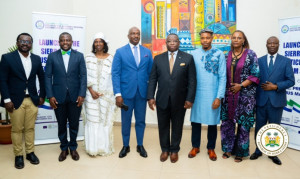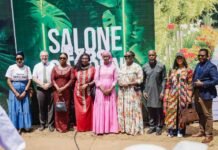By Amin Kef (Ranger)
In a pivotal moment for Sierra Leone’s justice system, President Dr. Julius Maada Bio officially launched the Justice Sector Reform Strategy 2024-2030 on Thursday, September 12, 2024, at the New Brookfields Hotel in Freetown. The strategy represents a crucial effort to improve justice delivery across the country, ensuring fair, impartial, and accessible justice for all citizens, particularly the marginalized and vulnerable groups, including women.
The strategy, developed by the Government of Sierra Leone, aims to address gaps in the justice system while enhancing access to justice for every citizen, regardless of economic status. Speaking at the event, President Bio emphasized the importance of making justice services available to all.
“At the heart of these reforms is ensuring that justice services are accessible to every Sierra Leonean,” President Bio remarked. “We are committed to ensuring that no one is left behind, particularly the vulnerable and marginalized members of our society.”
During his keynote address, President Bio underscored his administration’s focus on advancing the rule of law, promoting justice, and upholding human rights—key pillars of the “New Direction” development agenda. He emphasized the link between justice sector reforms and the Government’s Medium-Term National Development Plan, which prioritizes justice, human rights, and equal economic opportunities.
“I was elected on a platform of reform, with a strong commitment to advancing the rule of law and promoting justice and human rights,” President Bio noted. “Justice and accountability are critical to our national development aspirations, and every citizen must be treated fairly in criminal and civil proceedings.”
President Bio also highlighted the government’s responsibility in creating a secure legal environment for businesses and investments, stating, “When businesses are assured of access to their legal rights, it provides a secure environment for growth and investment.”
He commended the efforts of the Attorney General and Minister of Justice, Mohamed-Lamin Tarawalley, and his team for their hard work in preparing the strategy. President Bio further announced his assent to the Criminal Procedure Act of 2024, aligning it with the broader objectives of the justice sector reforms.
A key feature of the Justice Sector Reform Strategy is its “People-Centered Justice” approach, which places individuals and communities at the core of the justice delivery process. President Bio stated, “Our justice system must address the needs, rights, and participation of individuals and communities. This is the direction we are taking with our reforms.”
Since assuming office in 2018, President Bio has overseen significant investments in the justice sector. While acknowledging that more work lies ahead, he expressed satisfaction with the progress made in expanding access to justice, particularly for vulnerable populations. He also linked the reforms to Sierra Leone’s commitment to achieving the Sustainable Development Goals (SDGs) by 2030, with access to justice seen as critical to achieving these global targets.
“Sierra Leone stands as a concrete example of how policy actions on access to justice can transform societies, consolidate peace, and foster sustainable development,” President Bio stated. “Our commitment to creating an enabling environment for access to justice is not a choice, but an obligation.”
In concluding his address, President Bio called on all Sierra Leoneans to support the implementation of the Justice Sector Reform Strategy 2024-2030, emphasizing that its success is vital for promoting human rights, the rule of law, and sustainable national development.
“Let us come together and work as a team for the success of this crucial reform,” he urged.
The launch of this reform strategy signifies a significant step forward in Sierra Leone’s efforts to modernize its justice sector and create a more inclusive and equitable society for all its citizens.
The launch event also featured participation from the Human Rights Commission of Sierra Leone (HRCSL), a key institution within the justice sector. The HRCSL showcased its work through an exhibition that highlighted its role in promoting and protecting human rights. President Bio visited the HRCSL booth, where he reviewed materials, including a Public Inquiry Report on the Conduct of Law Enforcement Officials from 2015-2021, and received a copy of the report.
The Anti-Corruption Commission (ACC) also played a visible role at the event, showcasing its ongoing efforts to fight corruption. President Bio, accompanied by the Chief Minister and the Attorney General, visited the ACC booth, where he was briefed on the commission’s initiatives to raise public awareness and enforce anti-corruption laws.
The interaction between President Bio and the ACC team was warm and collegial, with the President expressing his appreciation for the commission’s hard work. He praised the dedication of the staff and reiterated his government’s unwavering support for the fight against corruption, stressing that the integrity and accountability of national institutions are paramount for the country’s development.
President Bio’s engagement at the ACC booth reinforced the importance of collective effort in building a corruption-free society and left a sense of pride and motivation among the ACC staff.
The Justice Sector Reform Strategy 2024-2030 is a bold initiative that promises to reshape Sierra Leone’s justice landscape, fostering trust, equity, and sustainable development for all its citizens.







